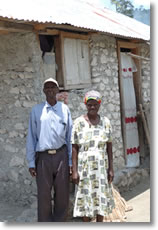by Rev. John Nunes
God has called us to work in His own mission in this world—a task made as difficult as it is necessary because of human separation from God. Whether we are working in the field of international development or in the mission field of North America, our witness gains integrity as we engage the real situations in which real people scrape to survive in our sin-scarred world. Martin Luther himself remains ever-relevant in our search for clues to the spiritual condition of the people we aim to reach in this world.
 |
|
Photo courtesy
|
Recently, I was involved in a meeting with U.S. Senator John Kerry and six others who work with faith-based, global organizations. It was an honor to represent Lutheran World Relief in this Washington, D.C., conversation with the senator from Massachusetts. When our talk turned to worldwide environmental issues, Sen. Kerry remarked that, in his estimation, Christians have impacted positively civil discourse in the United States and action around the globe. He especially noted how people who are motivated by the Gospel provide care for the poor and care for creation.
Arguably, these two ways of caring are intricately related—people living in poverty around the world often experience the worst consequences of environmental degradation. For example, small-scale farmers eking out an existence on the thinnest of margins have the least capacity to absorb the effects of deforestation, droughts, and expanding deserts.
Stress and Distress
Nearly 500 years ago, Martin Luther left the monastery in more ways than one. Luther’s robust intellect embraced the realm of contemporary ideas as he demonstrated how overarching societal questions were, in fact, “God questions,” raising themes as old as creation. His commentary on the first five chapters of Genesis tackles topics ranging from the environment to economics to marriage.
For example, Luther suggests that what remains of God’s original plan for marriage constitutes but a fraction of God’s original intent, which Luther actually quantifies mathematically as possessing only about 1/100th of the ideal.
Though a strong desire for a spouse remains ordinarily in human nature, that interest is tainted by “the prurience of the flesh and the execrable lust which is also the cause of sundry adversities and sins” (Luther’s Works [LW] 1:238).
The world in which we are in mission desperately—with brutish necessity—seeks to rationalize explanations of evil. On the hook of the Law’s guilt, we aim at selfjustification. It’s ironically amusing to hear the euphemisms people use to blunt the severity of sin’s sharpness: Sins are sometimes now called “issues”; temptations are downgraded to mere “distractions”; perversions are cutely termed “peccadilloes”; immorality is lightened to “inappropriate behavior.” But sin kills (Rom. 6:23).
Luther never softens his descriptions of sin, but he is a master of what some call haute vulgarisation—the art of taking complex ideas and making them simple, making theological truth plainly accessible to ordinary people.
For example, many people in Luther’s day (and in our own as well) had a hard time understanding God’s condemnation of Adam; it was considered overly severe, so utterly permanent. Luther says: “Our Lord God is always in the wrong, no matter what He does. . . . God is said to have gone too far. On the other hand, God freely forgives all sins, even the crucifixion of His Son, provided men believe, and this is also regarded as going too far” (LW 54:105).
 |
|
Photo courtesy
|
With an ear open to the piety of the pew, Luther speaks directly and with word-pictures that capture the hearers’ imaginations. I especially appreciate his exquisite painting of a pre-fall planet. Luther wistfully conjectures back to Eden as “truly a golden age.” In that time “before the fall, the sun’s light was more beautiful and clearer,” “the water purer, the trees more fruitful and the fields more fertile.” Dogs even were more obedient. The sharpness of Adam’s eyesight exceeded the eagle’s vision, his bodily strength surpassed the lion’s or bear’s, which he handled like we handle puppies. Luther sees no weeds, thorns, thistles, or even insects in this paradisiacal place. Certainly, neither infectious mosquitoes nor malaria. This is a temple for the entire world, a fresh creation flourishing in a problem-free environment, where life is truly hakuna matata—that Swahili phrase made famous in the musical The Lion King, meaning, “There are no worries.”
Not only our human nature, but the entire created order, according to Luther, has entirely “succumbed” to this disastrous fall into sin. Every occupation and calling becomes difficult. Even people involved in “paper pushing,” administrative tasks, and other non-manual labor, struggle, according to Luther: “We must utterly reject the opinion of those who maintain that only manual labor may be called work” (LW 1:211).
The Caribbean poet and Nobel Laureate Derek Walcott contemplates just one result: Then after Eden, / was there one surprise? / O yes, the awe of Adam / at the first bead of sweat.
Suspended between Heaven and Earth
Everything is undone, unhinged, ruined: The earth is cursed. Rivers flow erratically and are filled with fewer fish. Above, skies have in them fewer birds. Weather is undependable. Seasons change. Predators attack. Crops fail. For Luther, the fields become pulpits, environmental evidence of sin’s grip which preaches to us God’s Law: “Not only in churches, therefore, do we hear ourselves charged with sin,” he says. “All the fields, yes, almost the entire creation is full of such sermons” (LW 1:209).
The Creator, however, cannot forsake the creation. As Luther tells us in the Large Catechism’s explanation of the First Article of the Apostles’ Creed, God’s mission remains invested in us, to bless us, and for our salvation:
He causes all created things to serve for the uses and necessities of life. These include the sun, moon, and stars in the heavens, day and night; air, fire, water, earth, and whatever it bears and produces. They include birds and fish, beasts, grain, and all kinds of produce. They also include whatever else there is for bodily and temporal goods, like good government, peace, and security. . . . all that we have, and whatever else is in heaven and upon earth, is daily given, preserved, and kept for us by God.
Like Adam, we discover ourselves squeezed into a world of limits, laden with a new load of toil and labor, anguished by a brokenness, anxiety, and estrangement from God deriving from at least four sources: (1) from within ourselves, (2) from between ourselves and others, (3) from the natural realm around us, (4) and directly from the devil.
No aspect of life escapes sin’s poison. Hence, our mission: To convey to the world God’s saving gift; that is, Holy Spirit-worked faith in Jesus’ death and resurrection, which delivers the only antidote, the sole reconciling relationship that can fix what’s broken, heal what’s hurting, and forgive the many ways we’ve aggrieved God— including our disregard of our neighbor in need and our neglect of creation.
Often, during conferences or at speaking events, I will ask my audience to spend a few moments chatting about whether they think the world is getting better or worse. The answers usually blend a combination of positive and negative views. Luther himself registers a somewhat dismal view of the trajectory of humanity: “The closer the world is to its end, the worse human beings become,” he opines (LW 1:216). Despite this seen, or unseen, downward slope, all the baptized are called to act as optimistic witnesses to God’s grace in Jesus Christ.
Humanity on the Run
 |
|
Photo courtesy
|
Luther’s reflections on Genesis unveil the human person as rebellious yet imprinted with a noble drive to survive. Adam persists in sweat. He and his Eve are the first inhabitants of a fallen world. They had to do it all, Luther deduces, since the earth’s population was so small. Adam was the proto-man, a “father, king, and priest.” But humanity’s first family fractures with sibling jealousy, inciting fratricide. Abel shows up dead (Gen. 4:8–11). Cain falls deeper, wandering rudderless without oar. He’s left home, and his home has left him, banished to permanent wandering, to exile status, to being a fugitive: “And so, suspended, as it were, between heaven and earth, he cannot settle permanently anywhere. The result is that he has neither a secure dwelling place nor a secure place of refuge” (LW 1:294).
What do you do then with people who have no place to run and no place to hide, no place to escape and no place to reside, neither tabernacle nor temple? So little has changed in the human condition to which we are in mission in 2010.
The Failsafe Harbor
There is one failsafe harbor where the promises of God and the blessings of Jesus Christ are guaranteed to flow. The Church is the entranceway to this river of life. We are custodians of the environment and advocates for all who suffer from the ravages of sin. We cherish God’s world—even though it is now a thin reflection of the Garden’s glory. But neither people living in poverty nor the natural world are the truest treasures we have. From the Wittenberg church door to our Facebook social media, the missional message of confessional Lutherans remains consistent: “The true treasure of the church is the most holy Gospel of the glory and grace of God” (LW 31:31). Motivated by God’s glory and grace, we care for creation and the poor.
From the differently formed to the unborn without any opportunity to ever form, Luther directly links our mission with how we live among the least, last, lost, and the left-behind in society. Embraced by God’s grace, we embrace the human debris of our throwaway society as sister, brother, friend. Otherwise, warns Amos, our Divine Service sinks to the level of noise pollution (Amos 5:21–23). Our lives, like our liturgies, reach their zenith at the Table of the Lord, the hors d’oeuvres of restoration that anticipate the Day when justified sinners will be united forever with a holy God, that unending Day of ecological balance, of harmonious relationships, realizing Revelation 22’s depiction of ethnic healing (not ethnic cleansing) and the accomplishment of all mission in God’s perfected glory.
Rev. John Nunes (www.lwr.org) is president and CEO of Lutheran World Relief. He is the author of Voices from the City: Issues and Images of Urban Preaching and It’s All Good (forthcoming from Concordia Publishing House).
The quotations from Luther’s Works in this story are from the American Edition published by Fortress Press and Concordia Publishing House. Large Catechism quotations are from Concordia: The Lutheran Confessions (pocket edition), published by CPH.





